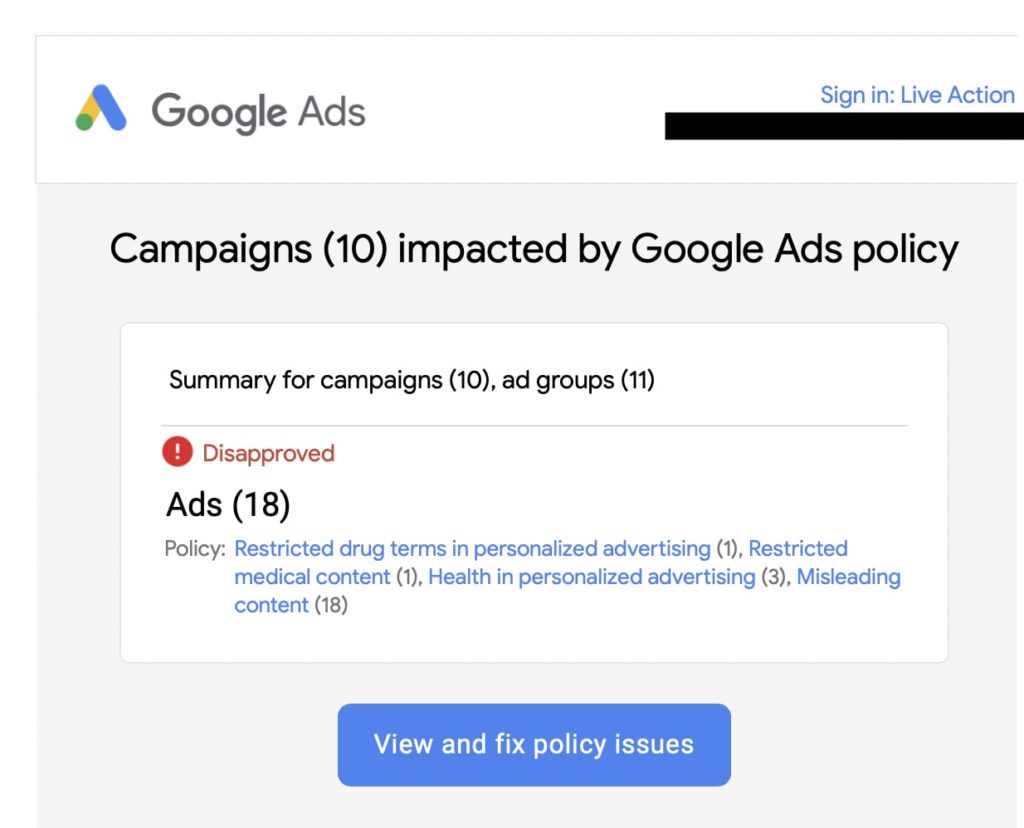
NASHVILLE (BP) – Google’s ban of ads by a pro-life organization reflects the frequent bias in the abortion debate and the deepening divisions in the culture, a Southern Baptist specialist in technology ethics said.
The California-based technology company blocked all ads on its platform by Live Action, the pro-life organization announced Sept. 14. Google restored some of the organization’s ads, including one for the video “Baby Olivia,” which depicts the development of a child in the womb from conception. It has continued, however, to bar Live Action’s ads for an abortion pill reversal (APR) hotline. The APR ads had been active for four months before Google’s action.
“[I]t is ironic that they do not allow ads that promote ‘harmful health claims’ as they allow the promotion of the abortion pill, which is not only potentially dangerous to the health of women but also lethal to the child she is carrying,” said Jason Thacker, chair of research in technology ethics for the Ethics & Religious Liberty Commission (ERLC), of Google. “The culture of death ushered in by the abortion industry will stop at nothing to present one side of these contentious and life-altering debates.
“Content moderation in our polarized society is extremely difficult work, but the continued pattern of content and advertising bans like this coming from across the technology industry only exacerbates the divides we face today,” Thacker said in written comments. “Christians need to be actively engaged in these technology policy discussions advocating for policies that reflect free expression, religious freedom, as well as a scientific-based understanding of the devastating effects of abortion on women, children and our communities.”
Medical abortions, also known as chemical abortions, are increasing in their frequency in contrast to surgical abortions. The drug mifepristone is used as the first part in a two-step process in such abortions. It causes the lining of the uterus to release the embryonic child, resulting in his or her death. A second drug, misoprostol, is taken two days after mifepristone and causes the uterus to contract, expelling the dead child.
In APR, progesterone is taken – optimally within 24 hours of taking mifepristone – to offset the effect of the abortion drug. Many reversals have been reported, however, by women who start the treatment within 72 hours of taking mifepristone, according to the APR website.
In a statement provided to Baptist Press, a Google spokesperson said the tech company does “not permit ads with unproven medical claims. Medical experts have raised serious concerns about abortion reversal pills.”
Google cited a statement from The American College of Obstetricians and Gynecologists that contends abortion pill reversal methods are “unproven and unethical.” In its statement of policy, ACOG considers abortion “an essential component of women’s health care.”
The Google spokesperson also said, “Beyond protecting users from medical harm, our policies do not distinguish between promoting pro-choice and pro-life messages. Advertisers are allowed to offer either abortion or abortion-alternative services. When doing so, both must prominently disclose which type of service they offer so that users have full transparency and can make their own decisions.”
Live Action is still “eligible to promote [its] perspectives and services as long as the ads do not violate Google’s policies,” the spokesperson said.
Live Action and other pro-life advocates denied APR’s effectiveness is unproven.
Natural progesterone has been used safely by in vitro fertilization doctors for more than 40 years to maintain a pregnancy after an embryo is moved to a woman’s womb, according to the American Association of Pro-life Obstetricians and Gynecologists (AAPLOG). The drug increases a baby’s likelihood of surviving from 25 percent to 68 percent when used as part of APR, AAPLOG reported.
“For women who change their mind after starting a chemical abortion, the administration of progesterone can give her a real hope of saving her unborn child,” according to AAPLOG.
Live Action President Lila Rose said the technology giant is no longer hiding its bias.
“By restricting scientific information related to abortion pill reversal and other life-saving options, while accepting paid ads promoting life-ending abortions, Google has chosen to operate by an outrageously dishonest and blatant double standard,” Rose said in a Sept. 14 release.
Some Republican members of the U.S. Senate have protested Google’s action. In a Sept. 16 letter led by Sen. Steve Daines of Montana, 11 senators urged Sundar Pichai, Google’s chief executive officer, to reverse the action. They said his company’s decision “reflects an unacceptable bias against pro-life views.”
“Google’s double standard on abortion is disingenuous and an egregious abuse of its enormous market power to protect the billion-dollar abortion industry,” the senators said. “The practical consequence of Google’s abortion distortion is that pregnant mothers in crisis will only have the option to be marketed abortion drugs through Google’s ad platforms, while life-affirming alternatives are suppressed.”
Thacker leads the ERLC’s recently launched Digital Public Square, a project that is designed to produce resources to assist churches and leaders on navigating the technological age with biblical wisdom.
















